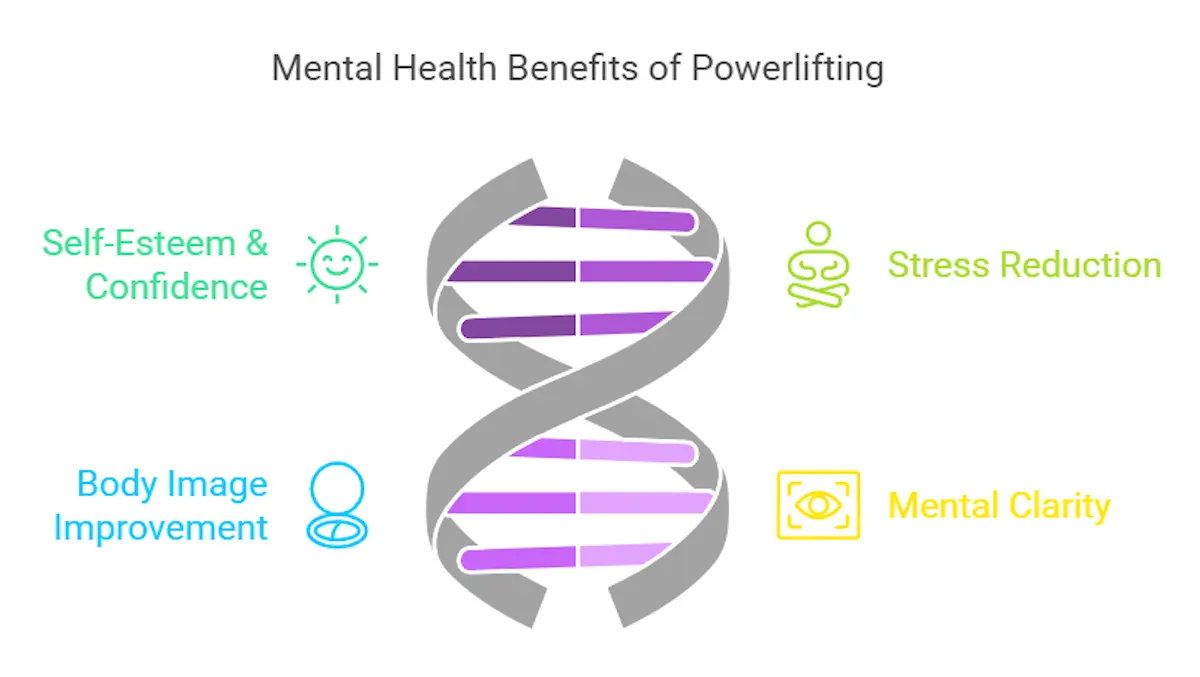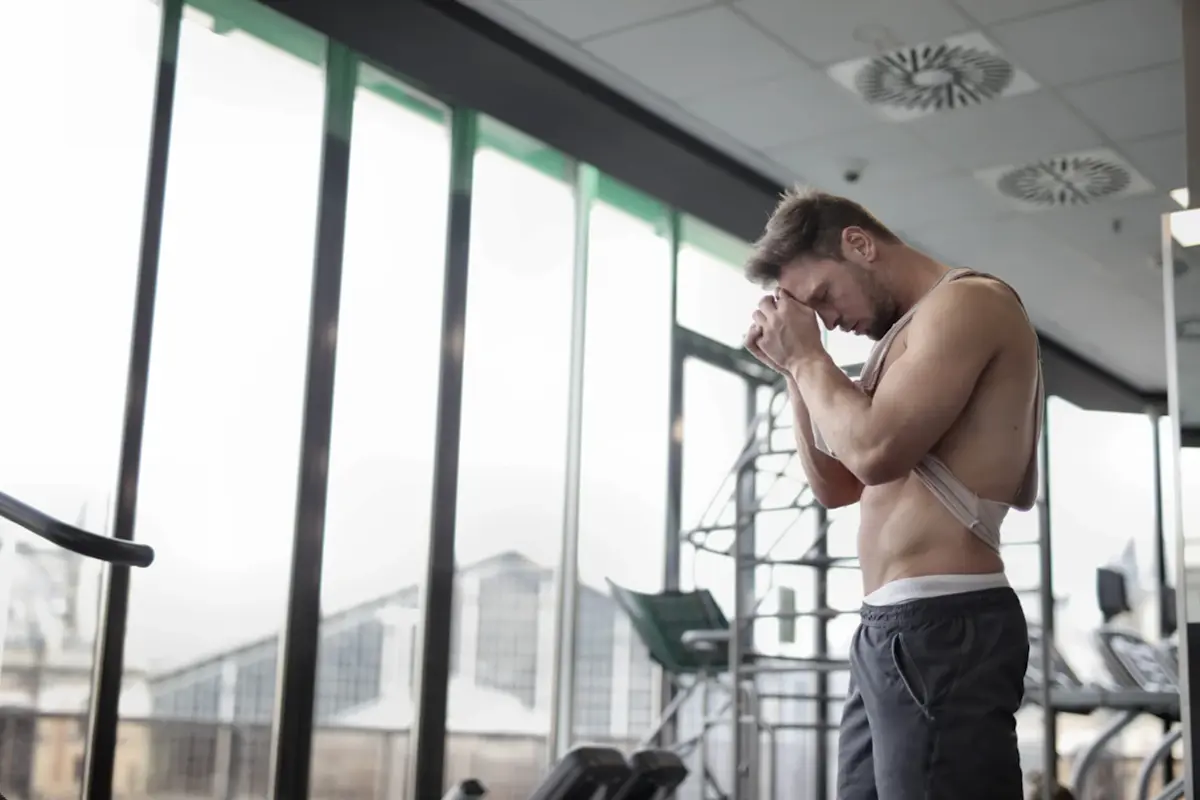Harnessing Mental Health Benefits of Powerlifting

What's In This Article
- Key Highlights
- Introduction
- The Mental Health Benefits of Powerlifting
- Balancing Training with Mental Wellbeing
- Dealing with Societal Pressure and Body Image
- Building a Supportive Community
- Conclusion
- References
- Resources
Key Highlights
- Powerlifting boosts self-esteem and reduces stress through endorphin release.
- Regular strength training improves body image and decreases disordered eating patterns.
- Mindfulness practices during training enhance focus and reduce performance anxiety.
- The sport challenges gender stereotypes by redefining strength across genders.
- Being part of a supportive powerlifting community significantly reduces symptoms of mental illness.
- Strength training increases brain-derived neurotrophic factor, promoting cognitive benefits.
Introduction
Men and women across different ages and backgrounds are increasingly turning to powerlifting, not just for its physical benefits of strength training but for its ability to promote psychological well-being.
This exploration focuses on the intricate relationship between powerlifting and mental health. Studies have shown that weight training, such as powerlifting and barbell exercises, is not merely a physical endeavour but also a potent tool for enhancing psychological health. It aids in elevating self-esteem, managing depressive symptoms, and promoting a positive body image. Furthermore, the discipline required to follow a strength training routine with barbell movements contributes significantly to psychological resilience and well-being.
Catherine Walter, a retired Oxford University Professor and world record holder in powerlifting, observed, "The confidence that comes from being strong is a great boost to self-esteem".
The mental fortitude developed is equally crucial in powerlifting, where physical strength is paramount. The sport offers a personal and unique experience and platform for people to challenge and overcome barriers, reshaping their mental state and contributing to overall brain health.

The Mental Health Benefits of Powerlifting
- Powerlifting has emerged as a significant contributor to enhanced self-confidence and self-esteem. The correlation between strength gains and an improved self-image is well-documented in sports psychology literature.
- Richardson et al. (2022) conclude, "the positive findings of female powerlifters (within this study) in terms of health, fitness, appearance evaluation and orientation does suggest a stable relationship with strength training on their perceptions and evaluation of their own body image". This effect is attributed to achieving physical strength milestones, reinforcing a sense of accomplishment and personal efficacy.
- Moreover, the act of lifting weights has a profound impact on stress reduction and mental clarity. According to research endorsed by the American Psychological Association, engaging in resistance training like powerlifting triggers the release of endorphins, the body's natural mood elevators (Plante et al., 2011).,(Koplas et al., 2012).
- This endorphin release not only alleviates stress but also promotes a sense of mental clarity and calm. The repetitive and focused nature of powerlifting routines aids in this process, offering a meditative-like state that allows for mental decompression.
Maria Garreffa, a former competitive powerlifter, stated that "strength training has had a profound impact on my mental health" and noted that the "increase in dopamine from a good strength session noticeably improves my executive function, which has a direct impact on [...] stress levels".
These findings align with the broader narrative within sports psychology, emphasising the mental health benefits of regular physical activity, especially resistance training. By fostering physical and psychological fortitude, powerlifting is a powerful tool to cultivate a healthier mindset and enhance the release of neurotrophic factor, mitigating stress hormones and promoting psychological well-being.
Mark Bell, a renowned powerlifter and coach, emphasizes the emotional power of lifting: "Think about someone you hate, think about someone that pisses you off, think about something that drives you, think about something that motivates you. [...] I can draw upon that any time I want and I feel like I can lift the freaking world when I think about that situation".

Balancing Training with Mental Wellbeing
Balancing training with mental well-being is a pivotal aspect of powerlifting, especially for anyone who juggles multiple roles and responsibilities. Creating a sustainable training schedule that harmonises the demands of powerlifting with psychological health needs is crucial.
Creating a Sustainable Training Schedule:
- Set Realistic Goals: Establish achievable goals based on personal and unique experiences, avoiding the comparison trap.
- Incorporate Rest Days: Schedule regular rest days to allow the body and mind to recover. This practice helps in preventing cognitive decline and preserves mental energy.
- Listen to Your Body: Body wisdom is essential. Pay attention to signs of fatigue or discomfort, adjusting the training intensity accordingly.
- Diversify Training: Include a variety of exercises, targeting major muscle groups without repetitive strain, which can lead to burnout.
- Monitor Progress: A training log helps track progress and identify necessary adjustments.
In addition to a well-planned training schedule, integrating mindfulness and meditation into a resistance training regimen significantly promotes well-being.
- Mindfulness in sports has gained attention for enhancing focus, reducing stress, and improving cognitive function. A study published in the "Journal of Cognitive Enhancement" (Kaufman et al., 2018) revealed that athletes practicing mindfulness experienced improvements in focus and a reduction in performance anxiety.
- Additionally, the release of brain-derived neurotrophic factor (BDNF) during strength training can enhance these cognitive benefits. These practices can be particularly beneficial in powerlifting, where mental focus is as crucial as physical strength.
Mindfulness and Meditation in Training:
- Pre-Workout Meditation: A short meditation session before training can help centre the mind, enhancing focus on the task.
- Mindful Lifting: Practicing mindfulness during lifting, focusing on movement, and breathing can enhance the mind-body connection, leading to a more effective and satisfying workout.
- Post-Workout Reflection: Spending a few minutes after training to reflect and mentally recap can promote a positive self-concept and reinforce the connection between performing physical activity and well-being.
Incorporating these mindfulness techniques into the powerlifting routine can significantly aid in balancing training with mental health, ensuring that lifters engaged in this sport maintain physical strength, psychological resilience and well-being.

Dealing with Societal Pressure and Body Image
Dealing with societal pressure and body image issues is a significant challenge for many, and powerlifting can play a transformative role in this regard. The sport challenges stereotypes and fosters a better body image by cultivating physical strength and emotional resilience, particularly among women lifters.
Challenging Stereotypes:
- Breaking Gender Norms: Powerlifting empowers women to break free from traditional gender stereotypes that often associate strength with masculinity. It redefines what it means to be physically and mentally strong for women.
- Empowerment in Physical Strength: Achieving physical strength milestones in powerlifting provides a sense of empowerment.
- Role Models in Powerlifting: The increasing visibility of powerlifters, who excel and compete at high levels, inspires, challenges outdated perceptions, and encourages more people to embrace the sport.
Positive Body Image through Strength Training:
- Research on Body Image: Studies have shown a positive correlation between strength training and improved body image in women. For instance, a study published in the "Journal of Health Psychology" (Hausenblas & Fallon, 2006) found that women who engage in regular strength training report higher levels of body satisfaction.
- Shift in Focus to Functionality: Powerlifting shifts the focus from appearance to functionality. A study on male competitive powerlifters found that they present healthy body image perceptions compared to males in other sports. The research concluded that powerlifters focus on their body functionality objectively rather than subjective perception, contributing to a healthier body image (Richardson et al., 2022).
- Reduction in Negative Body Image: Regular participation in strength training routines has been linked to decreased negative body image and disordered eating patterns. This shift is attributed to the improved self-esteem and empowerment from lifting heavy weights.
This sport offers more than just physical health benefits of strength; it provides a platform for psychological empowerment and a positive shift in how lifters perceive and value their bodies.

Building a Supportive Community
Building a supportive community is a fundamental aspect of powerlifting, especially when considering its many mental health benefits. A supportive environment enhances the powerlifting experience and contributes significantly to mental well-being.
Mental Health Benefits of Social Support:
- Enhanced Psychological Wellbeing: Being part of a supportive community in powerlifting can greatly promote psychological well-being. It offers a sense of belonging and shared purpose, vital for mental health.
- Reduction in Mental Illness Symptoms: Studies have shown that social support can help in reducing symptoms such as depressive symptoms and anxiety. For instance, a study in the "American Journal of Health Behavior" (Penedo & Dahn, 2005) found that social support is crucial in mitigating stress and improving mental health.
- Shared Experiences and Empathy: A community provides a platform for sharing experiences where members can empathise with and support each other through physical and mental challenges.
Finding the Right Gym Environment:
- Inclusive and Welcoming Atmosphere: Look for a gym where all members, regardless of their skill level or background, are welcomed and included.
- Qualified Coaches and Staff: Ensure that the gym has knowledgeable and supportive coaches who understand the importance of mental health in addition to physical training.
- Community Events and Activities: Gyms that organise community events, workshops, or group training sessions can foster a stronger sense of community.
- Positive Member Interaction: Observe the interactions between members. A supportive gym environment is often reflected in its members' positive and encouraging interactions.
- Testimonials and Reviews: Research the gym or training group online. Testimonials and reviews can provide insight into the community aspect of the gym.
Conclusion
In conclusion, the interplay between mental health and physical training in powerlifting is paramount. Powerlifting is a journey towards physical strength and a pathway to mental resilience and well-being.
- The sport offers numerous mental health benefits, such as improved self-esteem, stress reduction, cognitive abilities and a more positive body image. However, ensuring a balance between physical exertion and mental health is crucial.
- Creating a sustainable training schedule, incorporating mindfulness, and being part of a supportive community are key elements in maintaining this balance. These practices enhance the physical benefits of powerlifting and support mental health.
- It's important to remember that while powerlifting can significantly improve mental well-being, it is not a substitute for professional mental health care.
- For those who find themselves struggling with mental health issues, whether related to powerlifting or other aspects of life, seeking professional help is vital. Organisations like Mind, a mental health charity in the UK, provide invaluable support and resources for those in need. They offer guidance, information, and advocacy services, ensuring anyone facing mental health challenges can access the proper support.
- In powerlifting, as in all areas of life, the health of the mind is as essential as the health of the body. Embracing this sport can be a powerful tool for personal growth, empowerment, and mental health improvement. Still, it should be approached with a balanced perspective, where physical training and mental well-being are prioritised equally.
References
- Hausenblas, H. A., & Fallon, E. A. (2006). Exercise and body image: A meta-analysis. Journal of Health Psychology, 11(1), 66-79.
- Koplas, P. A., Shilling, A. E., & Harper, M. S. (2012). Reduction in perceived stress in healthy women older than 30 years following a 24-week resistance training program: A pilot study. Journal of Women's Health Physical Therapy, 36(2), 90-101.
- Kreher, J. B., & Schwartz, J. B. (2012). Overtraining syndrome: A practical guide. Sports Health, 4(2), 128-138.
- Penedo, F. J., & Dahn, J. R. (2005). Exercise and well-being: A review of mental and physical health benefits associated with physical activity. Current Opinion in Psychiatry, 18(2), 189-193.
- Plante, T. G., Coscarelli, L., & Ford, M. (2001). Does exercising with another enhance the stress-reducing benefits of exercise? International Journal of Stress Management, 8(3), 201-213.
- Richardson, A., Chen, M., & Chen, D. M. (2022a). Female competitive powerlifters' relationship with body image: Utilizing the Multidimensional Body Image Self Relations Questionnaire (MBSRQ). The Sport Journal, 24, 1-24.
- Richardson, A., Chen, M., & Chen, D. M. (2022b). Male competitive powerlifters' relationship with body image: Utilizing the Multidimensional Body Image Self Relations Questionnaire (MBSRQ). The Sport Journal, 24, 1-24.
- Thompson, R. W., & Kaufman, K. A. (2018). Mindfulness in sport performance. Journal of Cognitive Enhancement, 2(1), 72-85.